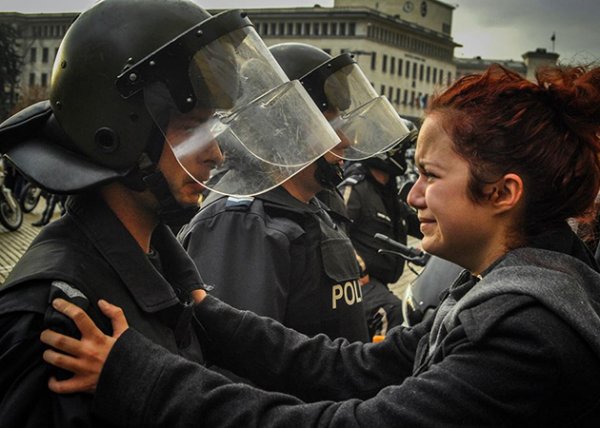Eight years ago, I wrote my first blog. It was about my experience of institutional racism in the Met Police and used an example to illustrate my own lack of understanding of the issues at the time I was serving. You can read ‘Institutional Racism, The Met and Me’ here here https://catemoore.wordpress.com/2012/04/09/institutional-racism-the-met-me/ and the next blog, ‘How to be Institutionally Better’ which addressed some of the responses I received https://catemoore.wordpress.com/2012/04/18/how-to-be-institutionally-better/. It is fair to say that whilst the underlying sentiments of my words then are still true today, I may express them a little differently now. I have learned that the power in what we say is often found in how we say it.
This summer has seen an outpouring of emotion across much of the world, after the incomprehensible cruelty of the death of George Floyd, a black American man during an arrest by a white American Police Officer. Black Lives Matter became a focal point for protestors, some of whom followed the ethos of the organisation, others who used the title as a powerful slogan. The protests across the UK had a slightly different focus to their American counterparts, encompassing the broad societal disadvantages many BAME people encounter. They were, with the exception of London, peaceful, respectful and organised with the full cooperation of local Police who were equally as appalled as anyone else at the brutal act which ended Mr Floyd’s life. London saw violence, as it so often does. The reason for this is not only that it is the Capital and a focus for more radical protestors. There is also a deep running lack of trust within communities – not only BAME communities – in the Met Police as an organisation.
I have purposely recounted this here because it is important to give context to the incident which has prompted this blog – my first in two years.
On 16th July, Met Police Officers were called to a fight in the street in N7. A man was arrested at the scene on suspicion of affray and possession of an offensive weapon (he was carrying a knife). Passers-by grouped around and watched the two Police Officers struggle to control the man. Someone filmed the three men struggling on the ground. It is difficult to see exactly what is happening but one of the Officers is utilising his knee at one point and trying to hold the suspect’s head down. The man shouts out “get off my neck”. The film was posted to social media and picked up by news outlets. Headlines stating ‘Met Police officer kneels on black man’s neck’ or words to that effect spread like wildfire. It was important that the Met make a statement as quickly as possible. What came, simply lit a different wildfire. The Deputy Commissioner, Sir Steve House said “The video footage I have seen today and which is circulating on Social Media is extremely disturbing….some of the techniques cause me great concern – they are not taught in police training.” He explained that after a review of the information to hand, they had suspended one Officer and placed the other on restricted duties, whilst having referred the incident to the IOPC to investigate. It was later revealed that the arrested man had been examined by a doctor and found fit to be detained and interviewed. He was charged with possession of a knife and was found to be wanted on recall to prison where the index offence was GBH. He was returned to prison from Police Custody.
There are plenty of people who have given their opinions on what the clip of the Met arrest shows. All are certain they know what they can see and many expand on what they think should now happen. I’ve read the gamut of opinions from those saying the Officers should be sacked immediately, to those saying Police should never be criticised for just doing their job. The polarisation that was already there feels intensely magnified. People on both sides are making such inflammatory and wild statements that the good points, also on both sides, are lost in the melee. We really can’t go on like this forever. Experience shows us things only get better when we listen more than we talk. The knee jerk reactions we have seen do no one any favours but I believe, if you swear an oath to become a Police Officer, then you must take the higher ground. Four years ago I wrote about the right wing tendencies I saw emerging on social media in some police related accounts. I linked it to the Political mood of the day and you can read that here, for a taste of how things have developed on social media and beyond in the ensuing four years https://catemoore.wordpress.com/2016/03/14/far-right-police-in-the-uk/ (For those feeling their blood pressure rising already, hang on – there’s more to say after I get through this bit!) If you identify yourself as a Police Officer, a retired Officer or even a supporter of Policing, you have an opportunity to represent the Service in every interaction both on Social Media and in real life. Don’t meet derision with derision. Don’t deflect the lack of trust with condescension and anger. Don’t expect people to know about restraint techniques and definitely don’t expect them to understand how messy the reality of restraining someone against their will can be. Police Officers are given a very weighty responsibility. They can take away anyone’s liberty at any time – it is easy to become blasé about that power but I think it is the single most important point in the conundrum that is London’s community friction with their Police Force. Officers and members of the public are not equal and that lack of equality increases with the degree of deprivation people live with. This is why Police Officers must take a step back and meet the distrust, fear and anger with an open mind and an open heart.
Of course, that won’t solve anything. It is going to take much more than mass humility. People are angry. Parents are frightened for their children. Telling them they don’t understand what they’re talking about is not going to help. Not least because it is often the people saying this the loudest, who really don’t have a clue or don’t want to acknowledge the effects of the deprivation which pits so many against authority from an early age. Explain, explain and explain again. Policing is messy. It can look horrible, particularly at that pivotal point when liberty is taken away from someone who does not want to comply. Why do Forces not have long term programmes to show use of force to members of the communities they Police? It should not be a taboo subject – let anyone and everyone learn and experience how different it is, for instance, to detain and keep hold of someone who is cuffed to the front rather than the back. Explain the techniques used and the reasons for them – very often what looks particularly awful is done to protect the person and those around them. Give people an idea of how it feels to have no back up but be surrounded by a hostile crowd. Engage people who are negative.
These conversations can be had by individuals everywhere but it is for Police Chiefs to forward via their own Forces to begin to engender confidence where there is currently very little. The impact of events in the Met and other large Forces impact confidence across the Country yet the figures for public confidence in Police remain high – that is an aggregated measurement across all Forces. UK Government figures published on 4th March 2020 show a 75% average in public confidence in Police across England and Wales. This is broken down by ethnicity, age and gender but not by Force. It won’t surprise anyone to know the lower confidence levels were in 16-20 year olds, particularly of Black or Mixed Race ethnicities. Men had slightly lower confidence than women except for Mixed Race women who had the lowest of all. It is worth noting that whilst Travellers, Gypsy and Roma peoples are counted, their results are not shown. You can delve further in the figures, which do show a slight downward trend, here https://www.ethnicity-facts-figures.service.gov.uk/crime-justice-and-the-law/policing/confidence-in-the-local-police/latest#:~:text=in%20the%20year%20ending%20March%202019%2C%2075%25%20of,people%20to%20have%20confidence%20in%20their%20local%20police
Sir Stephen House was likely seeking to appeal to those people with dwindling confidence when he issued his statement on the 16th July arrest. He was roundly decried by lots of serving and retired Police Officers who repeatedly referred to him throwing the Officers ‘under a bus’. The statement was seen as a betrayal by senior police leaders of the ‘rank and file’ who face the anger and lack of trust daily and have to risk their own safety to do their jobs. Only one day earlier, the Deputy Commissioner had been at the London Assembly’s Police and Crime Committee where he defended Officers’ actions in some earlier incidents which social media had judged to be racist. The Officers involved had been filmed and the incidents had been viewed by increasingly angry people, just like the arrest on the 16th. Sir Stephen said of these earlier incidents “…those Officers who the IOPC basically are saying didn’t do anything wrong, have been castigated in social media and indeed the main stream media, and will now get no apologies from anyone, for simply doing their job, for using force in a proportionate manner. That’s what I object to. And that is also very difficult for the Officers to take.” (source, Guardian article, 15th July. Headline: Police Treated unfairly over incidents caught on video, says Senior Met Officer.)
There is clearly a disconnect between the stance taken on the 15th and that taken on the 16th. This is a matter for the Met and perhaps the London Assembly to look into as Met Officers need to know they are supported in their daily work as much as they need to know that wrongdoing will not be tolerated. The lines, currently, seem to be blurred and that will inevitably translate to the streets. The time for knee jerk statements has long gone. The public don’t feel reassured and the Officers feel abandoned. One group cannot be helped without the other now. There is work to be done nationally, but mostly in the large urban Forces where quality has begun to give way to quantity. Police Chiefs have tiptoed around the issue of institutional racism for too long. Only a radical approach will make any difference now. We speak of integrity like it’s a treasured possession. Instead of keeping it like our grandma’s best tea set, for special occasions, let’s use it every day.
In the meantime, whilst Chiefs work out how they will move forward, there is something everyone can do to help. Whether you are reading this because you believe the Police to be a racist organisation, or because you love Police and think it can do no wrong, or you are somewhere on the vast spectrum between those two points – we can all help those most disenfranchised peoples. Only today I have read tweets calling senior officers ‘the enemy within’, referring to people at illegal street parties as ‘feral rats’, bystanders who film police as ‘a chavvy audience’, retired Officers urging Met Officers to resign, a 47 yr old man who refused to be compliant once in cuffs referred to as a ‘lad’ who was subjected to ‘extreme violence’ from the Officers. And it goes on and on. Both sides, wildfires that refuse to burn themselves out and can’t burn out each other. We can all stop responding to inflammatory tweets and if we are in any way connected to Policing, we should be calling out negativity towards others. Social Media should not be the place to air frustrations, unless those frustrations can be explored, challenged and possibly resolved. We can’t put out those wildfires ourselves, but we can dampen them to give everyone time and space to work out how to move forward. Together.

 This Summer saw the first Policing Governance Summit from CoPaCC and Policing Insight. I am not one for the Conference circuit but I was honoured to be asked to present at this one as it was an opportunity to be heard by a range of PCCs and OPCC staff. I have reproduced my speech in full here, in the hope to continue the conversation. The book I refer to is Policing and Public Management: Governance, Vices and Virtues.
This Summer saw the first Policing Governance Summit from CoPaCC and Policing Insight. I am not one for the Conference circuit but I was honoured to be asked to present at this one as it was an opportunity to be heard by a range of PCCs and OPCC staff. I have reproduced my speech in full here, in the hope to continue the conversation. The book I refer to is Policing and Public Management: Governance, Vices and Virtues. 

 This Monday, 8th August 2016, the Daily Mail published an article by a journalist on their ‘Investigations’ team, called Lucy Osborne. The article was titled, rather sloppily: ‘A law unto themselves. How YOU pay thousands for Police Chiefs’ household bills and private health care – while THEY take up to 64 days holiday’. Being an advocate of justice and a strong supporter of the public sector, I was compelled to read the article. What I found was surprising, given that the author works on some kind of ‘investigative’ brief. A raft of FOI requests had been sent out and then some of the replies had been worked into what tried very hard to be a shocking article. Unfortunately, the author did not understand what she had requested or indeed what information she had received back. I thought it might be useful if I draw together the information people need to make a fair judgement for themselves.
This Monday, 8th August 2016, the Daily Mail published an article by a journalist on their ‘Investigations’ team, called Lucy Osborne. The article was titled, rather sloppily: ‘A law unto themselves. How YOU pay thousands for Police Chiefs’ household bills and private health care – while THEY take up to 64 days holiday’. Being an advocate of justice and a strong supporter of the public sector, I was compelled to read the article. What I found was surprising, given that the author works on some kind of ‘investigative’ brief. A raft of FOI requests had been sent out and then some of the replies had been worked into what tried very hard to be a shocking article. Unfortunately, the author did not understand what she had requested or indeed what information she had received back. I thought it might be useful if I draw together the information people need to make a fair judgement for themselves.
